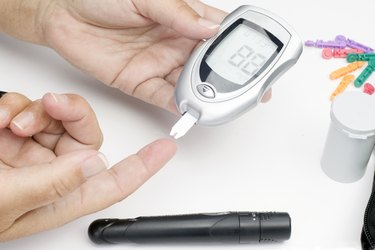
Keeping track of your blood sugar levels is not only important if you have diabetes, but it can also help you achieve a healthy weight, maintain good energy levels and prevent chronic diseases. You can easily obtain a blood glucose meter at your drugstore to check your blood sugar levels at different times throughout the day to see how your body reacts to the foods you eat. Your blood sugar levels can also change even when you go a few hours without eating. For example, skipping breakfast and not eating in the morning is likely to induce a rise in your blood sugar.
Food and Blood Sugars
Video of the Day
Measuring your blood sugar levels occasionally before and after a meal is a good way to observe how your food choices influence your blood sugar levels. Carbohydrate is the nutrient that has the most impact over your blood sugar because both starches and sugars, which constitute the total carb content of a food, are broken down to glucose and, therefore, contribute to elevating your blood sugar after a meal. If you skip breakfast or go for a few hours without eating, you would probably expect your blood sugar levels to decrease, but it actually causes a blood sugar rise in most people.
Video of the Day
Dawn Phenomenon
The dawn phenomenon corresponds to a normal effect that occurs in the early hours, while the secretion of many hormones occurs to prepare your body for the day ahead. Among the hormonal changes that accompany the dawn phenomenon is increased insulin resistance. If you are more insulin resistant in the morning, it means that your insulin is not as effective at keeping your blood sugar levels in check as it should be. The dawn phenomenon explains why many diabetics have higher blood sugar levels in the morning. Depending on the time you awake, you may see a rise in your blood sugar levels, even if you don't eat, just because of this phenomenon.
Liver and Blood Sugars
The human body is well designed to keep your blood sugar levels within a very narrow range. If you skip breakfast and do not eat for many hours, your body will sense that it is running low on glucose, one of the main sources of energy for your brain. To make sure that your brain doesn't lack sugar, your liver will start releasing sugar, either from stored glycogen or by producing new sugar from molecules of protein. As a result, you can see a rise in your blood sugar levels even if you haven't had anything to eat.
Eat Breakfast
Starting the day with a healthy breakfast can help you prevent a rise in your blood sugar levels later in the morning. Keep your carbohydrate intake moderate and fill up on protein and healthy fats. For example, instead of having a carbohydrate-heavy breakfast that includes breakfast cereals, fruit juices, toasts, bagels, pancakes, jams, syrups and sugary coffee, start your day with scrambled eggs with cheese and spinach accompanied with a small serving of plain yogurt and fresh berries. Alternate with a porridge made with slowly digested steel-cut oats served with cottage cheese, almond butter, a diced apple and cinnamon. Check your blood sugar levels later in the morning to ensure that these breakfast options help you maintain optimal blood sugar levels.
Is this an emergency? If you are experiencing serious medical symptoms, please see the National Library of Medicine’s list of signs you need emergency medical attention or call 911.